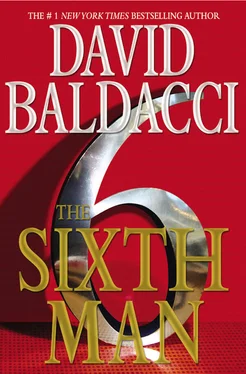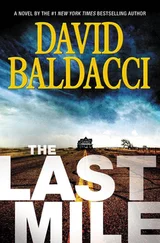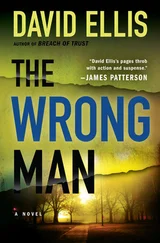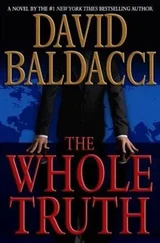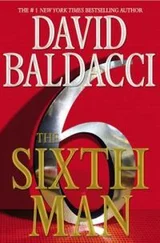“National security trumps a lot. It can trample civil rights. It can denude personal liberties. But it cannot and never will triumph over political gamesmanship.”
“Do you really believe that?”
She took a sip of wine. “I’ve actually lived it, Sean.”
He stared at her for a long time before speaking. “Okay, then tell me, are we a match for these guys?”
“David beat Goliath in the Valley of Elah.”
“But is our slingshot big enough?”
“I suppose we’ll find out.”
He sighed and tapped the table. “Comforting. So what about Bunting?”
“He’ll have figured out by now how you got on to him.”
“You think?”
“He’s a very smart man. Otherwise he would not have achieved what he has. However, he’s also a very nervous man right now. I’ve been following him around town. He’s met with several people, one of whom I find very intriguing.”
“Why?”
“When you see a rich spy king leave his usual haunts of upscale Manhattan to enter a ragged six-story walk-up with a pizza parlor in the lobby, you know something is off.”
“Who did he meet with there?”
“His name is James Harkes. A man that even I would find intimidating. And while I know you don’t really know me, that’s saying a lot.”
“You actually know this Harkes guy?”
“By reputation only. But it’s an impressive one.”
“Is he Bunting’s fail-safe?”
“More his guardian angel. For now. But he plays to more than one master. That’s the reason I gave you the gun. It must have occurred to you that because Bunting knows you’re on to him, Harkes may be unleashed against you and Michelle.”
Sean said, “I understand.”
“And that doesn’t take into account other assets that Foster and her allies could deploy.”
“Pretty overwhelming assets, I would imagine.”
Paul leaned forward and moved the olive oil bottle out of the way so she could hold Sean’s hand.
“What’s that for?” he said in a puzzled tone.
“I am not an overly affectionate person. I wanted to see if your skin was clammy and whether your hand was trembling.”
“And?”
“And I’m impressed because neither physiological reaction is occurring. I know you guarded the president, had an outstanding career until you made one mistake that destroyed it all for you. I know about Maxwell, too. She’s a bulldozer who can shoot the pants off most of the premier snipers in the military.”
“And I haven’t met the man she can’t put down.”
Paul let his hand go and sat back. “Well, that might change. Soon.”
“Are we on the same team now? Because everything you just said about us could just as well apply to you.”
“I don’t think they know I’m on to them yet, but I can’t guarantee that.”
“So, a team?”
“I’ll think about it.”
“We don’t have a lot of time.”
“I never said we did.”
“Why did you want me to come up to New York? All of this could be said over the phone.”
“This couldn’t.” She slid a package over to him. “The Glock, as promised.”
“Is that all?”
“No. One more thing. Would you like to see where Peter Bunting lives?”
Sean looked at her in surprise. “Why?”
“Why not?”
CHAPTER

44
EDGAR ROY HAD KNOWN something was wrong because the routine at Cutter’s Rock had changed. Every morning since he’d been here Carla Dukes had made her rounds. Cutter’s Rock could hold two hundred and fourteen prisoners, but currently only fifty inmates were being held here. Roy knew this by observation and deduction. He knew it by listening to the sounds of meal trays being delivered to cells. He knew it by hearing and distinguishing between forty-nine voices emanating from those cells. He knew it by overhearing the bed check calls from the guards.
And Carla Dukes had made a point of walking past each of these cells at precisely four minutes past eight each morning and four minutes past four each afternoon. It was now six p.m. and Roy had not seen the woman at all today.
Yet he had heard a lot. Whispers among guards. Carla Dukes was dead. She’d been shot in her home. No one knew who had done it.
Roy was lying on his bed staring at the ceiling. Dukes’s murder had interrupted the chronology of each memory he’d ever had. He wished ill of no one, really, and at some level he was sorry she had been killed. She had been brought here to keep an eye on him. She didn’t want to be here. And thus she blamed him for her dilemma.
He sensed the presence near his cell door. He didn’t look. He smelled the air. Edgar Roy didn’t simply have a nearly unique level of intellectual ability. He had senses heightened to an astonishing degree. It was all a case of special hardwiring in his brain.
It wasn’t a guard. He had processed and organized the smells and sounds of all the guards. There were a few support personnel who were allowed in the cell area, but it was none of them either. He had smelled this person before. He had also logged in his rhythm of breathing and his singular way of walking.
It was Agent Murdock of the FBI.
“Hello, Edgar,” he said.
Roy remained on his bed, even as he heard another man approach. A guard this time. It was the short one: wide hips, burly chest, thick neck. Name tag said Tarkington. He smoked and drank. Roy didn’t need heightened senses to know that. Too may breath mints, far too much mouthwash.
The electronically controlled door slid back. Footsteps.
Murdock said, “Look at me, Edgar. I know you can if you want to.”
Roy remained where he was. He closed his eyes and let the darkness in his head settle him into a place this man could not reach. Another sound. The rub of shoe soles on cement. Murdock’s bottom settled into the chair bolted to the floor.
“Okay, Edgar. You don’t have to look at me. I’ll talk and you listen.”
Murdock paused and then when he heard the next sound, Roy realized why. The guard walked away. Murdock wanted privacy. Then there was a nearly imperceptible cessation of powered machinery. Roy knew what it was. The video camera built into the wall had just been turned off. He expected the audio feed had as well.
Murdock said, “We can finally have a private conversation. I think it’s time.”
Roy didn’t move. He kept his eyes closed, forcing himself to sink into memories. His parents were fighting. They often did. For university professors existing in worlds of genteel theoretical tinkering they were unusually combative. And his father drank. And when he was in the bottle he was no longer genteel.
His next image was of his sister coming into the room. Already tall and strong, she had gotten between the two and separated them, forcing them into at least a temporary truce. Then she had picked Roy up and taken him to his room. Read books to him. Soothed him, because his parents fighting like that had always terrified him. His sister had understood his predicament. She knew what he was enduring, both in the outside world and, more subtly, within the complex confines of his mind.
“Edgar. We really need to end this,” said Murdock in a low, comforting tone. “Time is running out. I know it. You know it.”
Roy moved up to age five in his chronology. His birthday. No guests—his parents didn’t do such things. His sister, now sixteen, had already grown to her full height. She towered over her stepfather.
Roy was already five feet tall and weighed over a hundred pounds. Some mornings he would lie in bed and could actually feel his bones, tendons, and ligaments lengthening.
There was a small cake, five candles, and another argument. This one had turned violent, with a kitchen knife involved. His mother had been cut. And then Roy had watched in amazement as his sister had disarmed her stepfather, placed him in a hammerlock, and forced him out of the house. She had wanted to call the police, but their mother had begged her not to do it.
Читать дальше
